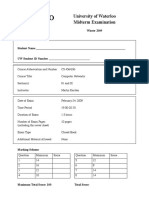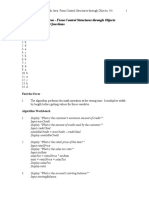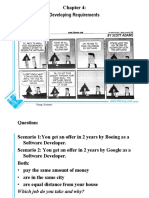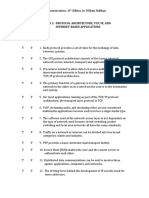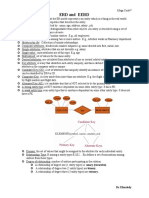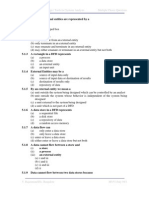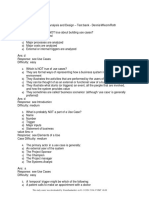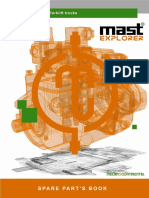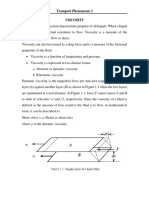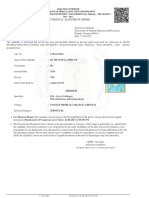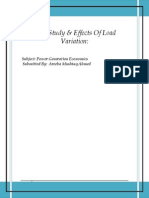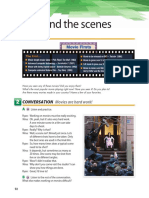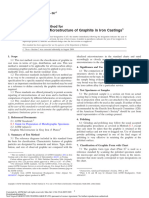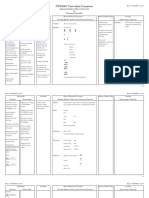Professional Documents
Culture Documents
Software Engineering 10th Edition Sommerville Solutions Manual
Software Engineering 10th Edition Sommerville Solutions Manual
Uploaded by
SamuelGomezkdpfOriginal Description:
Copyright
Available Formats
Share this document
Did you find this document useful?
Is this content inappropriate?
Report this DocumentCopyright:
Available Formats
Software Engineering 10th Edition Sommerville Solutions Manual
Software Engineering 10th Edition Sommerville Solutions Manual
Uploaded by
SamuelGomezkdpfCopyright:
Available Formats
Software Engineering 10th Edition
Sommerville Solutions Manual
Visit to download the full and correct content document:
https://testbankdeal.com/download/software-engineering-10th-edition-sommerville-sol
utions-manual/
Software Engineering 10th Edition Sommerville Solutions Manual
Software Engineering 10 – Solutions Manual 7
2 Software Processes
2.1 Giving reasons for your answer based on the type of system being
developed, suggest the most appropriate generic software process model
that might be used as a basis for managing the development of the
following systems:
• A system to control anti-lock braking in a car
• A virtual reality system to support software maintenance
• A university accounting system that replaces an existing system
• An interactive travel planning system that helps users plan journeys
with the lowest environmental impact
1. Anti-lock braking system This is a safety-critical system so requires a lot of
up-front analysis before implementation. It certainly needs a plan-driven
approach to development with the requirements carefully analysed. A
waterfall model is therefore the most appropriate approach to use, perhaps
with formal transformations between the different development stages.
2. Virtual reality system This is a system where the requirements will change
and there will be an extensive user interface components. Incremental
development with, perhaps, some UI prototyping is the most appropriate
model. An agile process may be used.
3. University accounting system This is a system whose requirements are
fairly well-known and which will be used in an environment in conjunction
with lots of other systems such as a research grant management system.
Therefore, a reuse-based approach is likely to be appropriate for this.
4. Interactive travel planning system System with a complex user interface but
which must be stable and reliable. An incremental development approach is
the most appropriate as the system requirements will change as real user
experience with the system is gained.
2.3 Consider the integration and configuration process model shown in Figure
2.3. Explain why it is essential to repeat the requirements engineering
activity in the process.
©Ian Sommerville 2014
Visit TestBankDeal.com to get complete for all chapters
8 Software Engineering 10 – Solutions Manual
You need to repeat the requirements engineering activity because it is essential to
adapt the system requirements according to the capabilities of the
system/components to be reused. These activities are:
1. An initial activity where you understand the function of the system and set
out broad requirements for what the system should do. These should be
expressed in sufficient detail that you can use them as a basis for deciding of
a system/component satisfies some of the requirements and so can be
reused.
2. Once systems/components have been selected, you need a more detailed
requirements engineering activity to check that the features of the reused
software meet the business needs and to identify changes and additions that
are required.
2.4 Suggest why it is important to make a distinction between developing the
user requirements and developing system requirements in the requirements
engineering process.
There is a fundamental difference between the user and the system requirements
that mean they should be considered separately.
1. The user requirements are intended to describe the system’s functions and
features from a user perspective and it is essential that users understand
these requirements. They should be expressed in natural language and may
not be expressed in great detail, to allow some implementation flexibility.
The people involved in the process must be able to understand the user’s
environment and application domain.
2. The system requirements are much more detailed than the user requirements
and are intended to be a precise specification of the system that may be part
of a system contract. They may also be used in situations where
development is outsourced and the development team need a complete
specification of what should be developed. The system requirements are
developed after user requirements have been established.
2.6 Explain why change is inevitable in complex systems and give examples
(apart from prototyping and incremental delivery) of software process
activities that help predict changes and make the software being developed
more resilient to change.
Systems must change because as they are installed in an environment the
environment adapts to them and this adaptation naturally generates new/different
©Ian Sommerville 2014
Software Engineering 10 – Solutions Manual 9
system requirements. Furthermore, the system's environment is dynamic and
constantly generates new requirements as a consequence of changes to the
business, business goals and business policies. Unless the system is adapted to
reflect these requirements, its facilities will become out-of-step with the facilities
needed to support the business and, hence, it will become less useful.
Examples of process activities that support change are:
1. Recording of requirements rationale so that the reason why a requirement is
included is known. This helps with future change.
2. Requirements traceability that shows dependencies between requirements
and between the requirements and the design/code of the system.
3. Design modeling where the design model documents the structure of the
software.
4. Code refactoring that improves code quality and so makes it more amenable
to change.
2.9 Suggest two advantages and two disadvantages of the approach to process
maturity that is embodied in the SEI’s Capability Maturity Framework.
Advantages of process improvement frameworks
1. The approach provides a means of measuring the state of a process and a
structured approach to introducing process improvements.
2. It is useful as a way of building on the experience of others in process
improvement.
Disadvantages of process improvement frameworks
1. Like any measurement system, there is a tendency to introduce
improvements to improve the measured rating rather than concentrate on
improvements that meet real business goals.
2. The maturity model approach is expensive and bureaucratic to operate. It is
not really suitable for organisations that use agile development.
©Ian Sommerville 2014
Another random document with
no related content on Scribd:
Poppy promptly turned on the gas.
“Good-by,” says he, “we’ll be back on the thirty-second of the month.”
But the giant knew a good thing when he saw it.
“Jest a minute; jest a minute,” says he, taking hold of a front wheel—and
bu-lieve me, we stopped! “If it’s cash in advance,” he came down, “we’ll
call it five-fifty.”
“Guess again,” says Poppy, putting on more gas to turn around, though to
no success.
“Five dollars even,” dickered the wheel holder.
“Nothin’ doin’.”
“Four-fifty.”
“Nope.”
“Brother,” then came the sad waggle, and the blue eyes shamed us, “you’ve
got a penurious disposition.”
“Yah,” grinned Poppy, unable to stay sore at the queer old geezer,
“whatever that is.”
“An’ furthermore, you’ve got a selfish disposition, my brother. Here I be, a
pore, hard-working man— I’ve got to have money to live on, even if they
hain’t no chewin’ terbaccy in it fur me, yet with money in your pocket you
begrudge me this chance of earnin’ an honest dollar.... I don’t s’pose,” and
there was a hungry, begging look in the giant’s face now as he bent over us,
“that you’ve got a plug of J. T. tucked away in some inside pocket, hey?”
The old hypocrite! For a moment or two I could only stare at him. Some
fine religion his was!
“Three years ago,” then came the sad story, as the giant, touched by the
memory of his earlier life wiped real tears out of his big blue eyes, “I was a
man of the world. Chewin’ terbaccy, movin’ pitchers an’ a car of my own
jest like this ’un.... What is it, a Ford?”
“A Rolls-Royce,” says Poppy proudly, spitting on his finger and massaging
a fly speck on the windshield frame.
“Of course; of course. Never heerd tell of it though. Looks kinda shot.”
“And it’s shot worse than it looks,” the grinning driver admitted.
“Wa-al,” came the continuation of the story, “steeped in the sin an’ iniquity
of the world, an’ with two wimmin wantin’ me to pick ’em fur a wife, one
an actress an’ the other a church worker, I up an’ made the foolishest move
of my life, pickin’ the wrong one, an’ in consequence here I be in a
religious penitentiary.... Gotta cigarette?”
“We don’t use ’em,” says Poppy, wondering, I guess, what crazy junk was
coming next.
“Any new wars goin’ on?” the giant then inquired.
“Wars?”
“We never git no newspapers out here—they hain’t ’lowed—so I don’t
know what’s goin’ on more ’an a mile away.... Douglas Fairbanks still
livin’?”
The old fellow was dead in earnest. Can you imagine? No wonder that
Poppy and I laughed our heads off. He had been dragged here against his
wishes by his new religious wife, he said. And to please her he had let the
leader of the gang give him a Bible name.
He was like a big kid in his talk. Some day, he told us, with a sort of
wistful, far-away look in his big eyes, he was going to run away from his
wife, of whom he seemed to be scared to death, and go back to the “sins of
the world.” Then he inquired about the latest prize-fight news, ending up by
asking who was President. I wanted to tell him “George Washington,” but
Poppy told him the truth.
Well, it was fun talking with him, but we were wasting a lot of good time.
Having sort of made friends with us, he confessed, as we further dickered
with him, that the regular toll fee for going through town in an automobile
was two dollars. If we hadn’t been smart, you see, he would have stuck us
for a five-spot, knocking down the other three dollars. As it was, we hated
like the dickens to let go of our money, for to a boy two dollars is two
dollars. But there was no way out of it. Paying him the money, we sort of
rode in state through town, looking for Noah and the whale, but to our
disappointment nobody came to rubber at us. There was a big community
picnic down the river, the giant told us. That’s where the people were.
Having crossed the river, we came to a steep hill. And how we ever got to
the top of it I can’t imagine. But we did. From then on the road was more or
less hilly. It was a glad moment, let me tell you, when we got a whiff of the
Neponset Corners slaughter-house. Hot dog, was our happy thought, as we
cantered into town. The good old concrete now.
I easily picked out Lawyer Chew’s house. For not only was it big like he
was, but it had the owner’s name chiseled on the stone horse block at the
curb. As further proof, I saw a fat boy in the yard who was a dead ringer for
old Chew himself.
Bang! went something under the car. But I didn’t jump this time. For I had a
hunch that it was a blow-out.
“Lawyer Chew will think that you’re trying to shoot him,” I grinned.
“Is that where he lives?” Poppy rubbered.
“Sure thing. Don’t you see his understudy on the lawn?”
The fat kid meandered into the street to watch the tire repairs.
“Some junk,” says he, turning up his nose—only he couldn’t turn it up very
high, for it was too fat.
Now, if anybody else had said that we would have grinned. But not this
young geezer. He was too much like his old man.
“Lookit!” I nudged the tire fixer. “We’ve got company.”
“Is it human?” says Poppy, taking a sweaty squint.
“It’s got arms and legs,” says I. “Nice plump ones, too.”
The kid’s face got red.
“Don’t get rosy,” says he, showing us a cute little scowl, “or you’ll get
pinned on.”
“Shall we kill it,” says I to Poppy, “and put it out of its misery?”
“Huh!” snorted little roly-poly. “You better shut up, if you know what’s
good for you. And you better git that old junk-pile out of the street, too. For
we don’t want trash like that in front of our house.”
Poppy promptly let out his neck.
“Where is it?” he rubbered.
“Where’s what?”
“The dog house that you were just talking about.”
“Bow-wow,” says I, to help things along.
“I’m going to call my father,” fatty then blew up, madder than a dozen wet
hens.
“Don’t bother,” Poppy turned up his nose, “for we’ve already met him.”
That put the kid wise, which proved that he wasn’t such a hopeless dumb-
bell after all.
“Now I know who youse guys are,” says he, giving us a pair of evil eyes.
“Who told you, Lena?”
“Lena? Lena who?”
“Lean against ’er.”
“You think you’re smart,” fatty danced. “But just wait! My father’s going
over to Garrison this afternoon to get the sheriff. And you’ll hear from him
before night—you and that other trashy pair out in the country. We’ll show
you who owns that house.”
“Eggbert!” a woman called from the porch of the big house. “EGGbert!”
Fatty turned.
“Now we know what it is,” I laughed. “It’s an egg.”
“Yah,” says Poppy, “a donkey egg.”
“Another crack like that,” frothed fatty, “and I’ll punch your face.”
“EGGbert!” came the impatient call. “Do you hear me? Papa wants you to
get under the buggy and tighten a nut. Come now, for he’s hurrying to go
over to Sandy Ridge on business.”
“Yah,” hooted Poppy, “go roll under the family carryall, EGGbert, and
tighten some of the nuts in your head.”
“Is there a county sheriff in Sandy Ridge?” I inquired of Poppy, when the
kid had gone.
Reading my thoughts, the other laughed.
“Old Chew isn’t heading for Sandy Ridge to get the sheriff, Jerry. He’s
going over there—so he thinks!—to draw up a will for a deaf and dumb
lady with cork legs who read about him in the Police Gazette and wants him
to take her money and build a home for crippled nutmegs.”
“Good night!” I stared at him. “Are you cuckoo?”
“Don’t you catch on, Jerry?” he further laughed. “To keep old Chew from
calling in the Garrison sheriff, I ’phoned here to the house, getting his wife,
and now he’s heading for Sandy Ridge on a wild-goose chase. He’ll be
gone all day looking for the rich lady with the cork legs, so Ma is safe until
to-morrow at least.”
Our tire fixed, we went another block to the concrete, only to learn, in sort
of sickening disappointment, that the road to Pardyville was closed. A
bridge had been washed out during the storm, and the automobiles going
east and west were hitting it along C. H. O., which was open again. Our
only way to get to Pardyville was to go back over the same road that we had
come, and then east on C. H. O.
I now saw that Poppy was worried. And I knew why. Facing another long
trip across the Sahara Desert he was thinking that we never would be able
to get to Pardyville and back that night. Not that we expected to meet the
granddaughter at the depot, but it had been a sort of vague hope with us that
we would get track of her in town, for Pardyville wasn’t a big place. If we
didn’t find her, or she didn’t soon show up of her own accord, it would be
all day with poor Ma. And that was no happy thought for us.
Young fatty yelled something at us when we passed his house on the way
back. But our old buss made too much racket for us to hear him. Anyway,
his smart gab didn’t interest us.
We never expected to see him again. But we did! And toward the last under
conditions that were pretty blamed exciting, let me tell you.
CHAPTER XI
THE RUNAWAY
I it was around eleven o’clock when we pulled out of Neponset
Corners on our way back to C. H. O. We had been three hours on the road,
and if we were as long going back it would be two o’clock before we came
to the big stone house where we had started from. To get to the highway
from there would eat up another hour. And how long it then would take us
to get to Pardyville, we could only guess at. However, we were going to do
the best we could.
“If only we had known in starting out,” groaned Poppy, “that C. H. O. was
open. We could have been in Pardyville by now.”
“Yes,” says I, of a sort of financial turn of mind, “and we would have
twenty dollars in our jeans instead of eighteen.”
That stirred up the other one to more unhappy thoughts.
“Good night!” he yipped, yanking the steering wheel just in time to keep
our Rolls-Royce from kicking over a tree. “Do you suppose we’ll have to
cough up another two bucks to get through that crazy town?”
“I don’t see how we’re going to escape it,” says I, “unless our gallant little
gas chewer grows a pair of wings.”
“The blamed robbers! It’s a skin-game, Jerry.”
“Nothing else but.”
“Still, I don’t blame old Goliath so much. He’s got to do what the others tell
him, I suppose.”
“He tried to skin us on his own hook,” I reminded, a bit stiff in my feelings
toward the tricky old geezer.
“He didn’t get by with it, so why hold it against him?”
“You seem to like him,” I grunted.
“I feel kind of sorry for him, if you want to know the truth of the matter. For
he hates it there. He said so. And for that matter what man with any sense
wouldn’t hate to live in a place like that? I’d as soon be in jail myself.”
“His wife must be a regular old rip-snorter,” I laughed.
“She sure has him buffaloed, all right.”
“Some women like to be bossy.... I hope I don’t get that kind.”
“You!” laughed Poppy. “I didn’t know that you were thinking of getting
married, Jerry.”
I made a sudden grab for my smeller.
“Phew!” I gurgled. “Whiff that old slaughter-house.”
We learned afterwards that the cluster of rickety buildings set back from the
road wasn’t a slaughter-house outfit, as we had supposed, but a rendering
works. Old dead cows and horses were brought here to be boiled and then
ground up into chicken feed. To judge from the ravishing smell the dead
animals were left to ripen in the hot sun for two or three months before they
were stuffed into the jaws of the grinding machine.
When we were in the thickest of the lumpy smell, the old snail started to
shimmey, as though, with some such feeling as we had, it was getting ready
to heave up its mechanical insides. Then it gave a final stagger and dropped
dead.
“For the love of mud!” I gurgled. “Throw in the clutch.”
“I can’t make it work.”
“What!” I squeaked. “Are we stalled?”
The other took that as a slam at his driving, I guess.
“Oh, no!” came sarcastically. “I’m just dilly-dallying along so that we can
enjoy the magnificent scenery. And see the beau-utiful wild flowers!” he
gestured, like a nut. “Aren’t they perfectly scrumptious?... Climb out, Jerry,
and see if a hunk of the engine is dragging in the sand.”
I got out, all right—and in a hurry, too, let me tell you. But don’t imagine
that I stopped to check up on the engine. Not so you can notice it. What I
did instead was to hoof it for the back-line trenches, away from the firing
line, as fast as my number eights would carry me. Let the dead cows and
horses fight it out among themselves, was my indifference. Their troubles
weren’t anything to me.
Nor did Poppy stick it out very long, with the hunks of future chicken feed
sizzling past his nose like swarming bullets.
“The beau-utiful wild flowers,” I mimicked, as he staggered out of the
smoke of battle.
“Traitor!” says he, and he kind of meant it, too.
“What did you expect me to do?” I flung back at him. “Stand between you
and the wind and fan you with a perfume bottle?”
This last mess proved beyond all doubt that our luck had deserted us.
Whether we had seen them or not, thirteen black cats had skulked across
our path that morning. Nor did it add any to the joy of the occasion to have
the leader and I growling at each other. Anyway, to our credit, we aren’t the
growling kind. So pretty soon we were all right again. And seeing the funny
side of our crazy adventure we almost laughed our heads off.
“Whistle,” says I.
“What for?” says Poppy.
“Maybe it’ll come to you,” says I, pointing to the car, suffering in the
thickest of the gas attack.
“How would it be,” grinned Poppy, “if we climbed the fence and moved the
stink factory?”
“I’ve got it!” I yipped. “Let’s turn off the electric fan,” meaning the wind.
“And we used to think that Limburger cheese was delicious!”
“And sauerkraut,” I gagged in company.
At noon the thick smell sort of quieted down. Either the wind had switched
or the supply of ripe horses was running low. We could stand it now to go
back to the car, where Poppy got to work. And did any music, even a
calliope, ever sound as sweet to me as the first healthy snort that came out
of that old engine when the tinkerer finally got the jigger cornered that was
causing all the grief.
But within ten minutes we were hung up again. Nor could we get anything
out of the old engine now except the weakest kind of a wheeze. We cranked
and cranked. Boy, it was hot work. Our tempers were hot, too. Yes, and our
stomachs were empty. Don’t forget about that.
Poppy was thorough. He unscrewed everything that wasn’t riveted down.
At one time we had enough junk spread around in the sand to build six
engines. And the funny part is that the more stuff we took away from it the
healthier the old gas eater sneezed.
We worked till six o’clock. Then we gave up. It was no use, Poppy said.
And if you could have seen how greasy and fagged out that poor kid was
you sure would have had a hunk of pity for him.
What should we do now—get a garage man from Neponset Corners, or go
on afoot? I knew something about garage bills. One time I fiddled with
Dad’s car and it cost him seventeen dollars and fifty cents to find out that
my new way of attaching the sparkplug wires wasn’t a complete success.
All we had with us was eighteen dollars. And what could any garage man
do to this old junk-pile with eighteen dollars? Certainly, with the big end of
our hitch-hike still ahead of us we would need every cent that we had. So
we decided to hoof it for home. Yet the thought of that long sandy walk had
us licked before we started in.
Weak as he was, Poppy still had a voice.
“Anyway,” says he, as a final effort, “we’ll give it ten more cranks apiece,
and then if it won’t start we’ll kiss it good-by ... and hope that in the next
world it suffers as much as it has made us suffer.”
“I’ll crank it first,” says I, seeing how fagged out he was.
Well, can you imagine our great joy when the old hunk of iron, at the first
twiddle of the crank, grabbed the bit in its teeth and started off as friskily as
a two-year-old colt!
“There you are,” says I, acting big. “Any time you want it started, kid, call
on a real mechanic.”
“Quick!” cried the driver. “Jump in before it stops,” and joining him in a
flying leap, away we went down the skyline at our usual break-neck speed.
But the jinx that was trying to chloroform us with bad luck hadn’t used up
all of its dope. Bang! went a hind tire. That meant another hour. It was
growing dark now. Instead of getting a look at Pardyville that day, we’d be
lucky if we saw the inside of the big stone house before midnight. A whole
day wasted! And the two of us done up for nothing, as you might say. No
wonder we were out of sorts.
It was eight-thirty when we crossed the river. New Zion was just ahead of
us. But the whole town was in darkness.
“They go to bed early,” I yelled at Poppy, as we hurtled along like a
crippled turtle.
“Without any picture shows to go to, or anything to read, what else can they
do?” the driver yelled back.
“Maybe,” I yelled then, “we can get through town without them catching
us.”
Quick to act on that thought, Poppy stopped the engine and switched off the
lights, of which only one was working up in front.
“If we use our wits, Jerry, we ought to be able to save that two dollars. For
instance,” came the plan, “as soon as old Goliath stops us, instead of
forking out our two dollars, we’ll hit him for something to eat. Two suppers
will be four bits in his pocket, we’ll tell him. All right. When we get ready
to leave for home the old engine won’t run. We accidentally dropped a gee-
whacker. See? And you go back with him to try and find it. That gives me a
chance to beat it. And once outside of town, I’ll shut off the lights and wait
for you.”
“Lovely!” says I. “And suppose old blunderbuss grabs me and takes the two
dollars out of my hide?”
“Shucks! As soon as he hears the engine running he’ll start back on the
gallop. Then you can easily follow him in the dark.”
“And how about yourself?” says I. “You’ll be out of luck if the old bus
stalls before you get away.”
“If I put up the two dollars, he can’t any more than bawl me out.”
“All right,” I gave in. “If you’re willing to take a chance, count me in, too.”
I got out then to jiggle the crank. And what do you know if I didn’t actually
fall over old Goliath’s big feet. He had been standing in the dark taking in
every word we said! And right then, let me tell you, is one of the times in
my young life when my heart, as the saying is, did a neat little loop-the-
loop in the roof of my mouth. For see how big he was! Good night!
But the giant didn’t grab me and start twisting me into fancy bowknots, as I
had feared that he would. Instead, as I stumbled, he steadied me as gently as
you please.
“Sh-h-h-h!” says he in a sort of drawling whisper, to keep me from yelling,
I guess. “You boys got here jest in time to help me.”
My voice was gone. I had swallowed it. But Poppy still had his.
“Help you?” says he. “What do you mean?”
“I’m runnin’ away. I hain’t a-goin’ to live here no longer, like a prisoner,
an’ have a woman boss me ’round. No, I hain’t! I jest set my foot down.
An’ now that you boys is here, I won’t have to walk.” He started to get into
the car. “Shove over, Sonny, an’ I’ll show you tricks with the steerin’ wheel
that I picked up when you young sprouts was jest learnin’ how to wear
pants as wasn’t hitched onto you with safety pins.”
CHAPTER XII
DR. MADDEN COMES HOME
P and I were doing a sort of double-decker stunt now. We had to in
riding with old Goliath, for he took up two-thirds of the seat. But we didn’t
kick, however crampy it was for us. As a matter of fact, we were only too
glad it wasn’t any worse. Think what might have happened to us if old
heavy-weight had been tending to business, as official toll collector, instead
of scheming to his own escape. Br-r-r-r!
I guess, if the truth were known, we acted kind of simple. You know how it
is with a fellow when he gets caught with his fingers in the company jam
jar. We didn’t know what to say. And every minute we expected old
blunderbuss to get his memory to working on our trickery, as he had
overheard it, and start bawling us out.
But to our surprise he was as nice as pie. Either he had completely forgiven
us, we decided, or in some dumb way had failed to catch on. So it wasn’t
hard for us to put away our uneasiness. More than that, in our happy-go-
lucky way, we brought out a pair of perfectly good grins. And to that point,
I don’t know how any kid with fun in him could have ridden beside that old
geezer without grinning. Say, that was some ride. First a tree would jump at
us out of the darkness, then the corner of a house, then a hunk of sidewalk.
It was a lucky thing for all of us that the whole town was asleep. For
otherwise we might have been jailed for intoxicated driving, or whatever
you call it—like the time back home when Paddy Gorbett drove into the
Presbyterian church and started bawling the minister out because the garage
was full of pews.
To a rosy view of things, how handy old Goliath would be, we thought, if
the Galloping Snail got another balky spell. Big as he was, he could push
beautifully. If necessary, with so much muscle, he could make the old
engine zip whether it wanted to or not. So it couldn’t put anything over on
us. We really were lucky in having him along, we concluded. And most
wonderful of all, we had saved our two dollars, though not in the way we
had schemed. To this point, however, as you will see, our joy soon lost its
jiggles. Like the man with the nest of rotten eggs, we had counted our
savings before they were hatched.
Having navigated into one end of Main Street and out the other, without
upsetting anything any bigger than the car itself, the driver suddenly
remembered that he had a duty to perform and stopped outside of town.
“Boys,” says he in that deep drawl of his, “we want to be fair an’ square.
Fur in startin’ out in any undertakin’, this ’un unexcepted, a feller never gits
very far who isn’t fair an’ square.”
“Meaning which?” says Poppy suspiciously.
“We owe the town two dollars. An’ it’s our bounden duty to pay it. Then we
kin leave here with a clear conscience.”
“Forget about your conscience,” says Poppy quickly, “and throw in the
clutch.”
“No, I kain’t do that. In runnin’ away from my wife, I’ll have enough on my
mind without wantin’ my conscience to further prick me in the thought that,
through me, these pore suckers, who don’t git six square meals a year, was
cheated out of eight good soup bones.”
The upper deck nudged me.
“I know a good scheme, Mr. Goliath.”
“Um.... Hopple is my name—Samuel Cassibaum Hopple.”
“Well, Mr. Hopple,” came the foxy plan, “knowing the layout as you do,
suppose you go back and ask Noah if we can’t have a special evening rate
—a dollar and ninety-eight cents, or something like that. As you’re leaving
with us, I think the gang in the ark ought to sort of set up the treats. Don’t
you?”
But old Samuel Cassibaum Goliath Hopple was no dumb-bell. Not on
Tuesday evening, anyway.
“Um ...” came sharply, to let us know that he was setting his big foot down
and wanted no further nonsense from us. “You jest come across with that
two dollars an’ quit tryin’ to work me.”
“But, listen—” Poppy hung on.
“They hain’t nothin’ to ‘listen’ to. We owe the money. An’ bein’ an honest
an’ upright man, I hain’t a-goin’ to have it on my conscience that I skipped
out an’ never collected it. It’s my last duty.”
But Poppy was as hard to corner as a lost collar button.
“You say we owe the town two dollars. All right. How much do you
weigh?”
“Me?” came in surprise. “About three hundred pounds.”
“Jerry and I together don’t weigh that much,” says Poppy. “So, according to
weight, you pay a dollar and we pay fifty cents apiece.”
But did old hefty fall for that clever little scheme? Not so you could notice
it. Nor did he let us argue the matter further. Put up and shut up, were the
orders we got, so, though we hated him now, we “put up,” as he expressed
it, and thus saved our hides.
Taking the key of the car with him so that we couldn’t skin out, he was
gone at least ten minutes. But if he woke up the gang in the ark to deliver
the two dollars to them, there were no distant lights or sounds to prove it.
Certainly, we didn’t hear any elephants or camels doing their stuff. The big
boy was wiping his eyes when he came back. Even when a fellow’s wife
had the rolling-pin habit, he told us sadly, blowing his nose, there was a
certain amount of regret in leaving her.
Then on we went into the night, the old bus rattling and groaning as though
each minute would be its last. But it held up, which showed that old Goliath
was bringing us good luck, even though we had lost our two dollars. So it
wasn’t right for us to hate him. Anyway, as I told Poppy, though the
collection of the two dollars had seemed unnecessary to us, the big one had
done what he thought was right. And when a fellow does that you’ve got to
give him credit for it.
It was our scheme now to take the old geezer home with us and put him up
for the night. Ma Doane wouldn’t care. And with a “spook” to catch and
various other mysteries to solve, it wasn’t a bad plan, as you can see, to
have a big guy like that on our side. If we went to Pardyville in the
morning, he could go with us. Or if he was ready at breakfast time to go
back to his wife and let her lovingly use the rolling pin on him, that was all
right, too. We weren’t particularly interested in his plans.
Presently we met a horse and buggy in the sandy trail. I thought of Lawyer
Chew right off. That was natural. But it wasn’t old fatty. Pulling out to let
the rig go by us, and stopping for safety, I had the queer feeling, as our
skinny light struck the buggy, that a pair of gimlet eyes were boring holes
through us. Who was this thin-faced, foreign-looking man, I wondered,
uneasy in the meeting.
Goliath then told us that it was Dr. Madden of Neponset Corners.
“I used to see a lot of him before he went to Europe. Guess he jest got back.
Some one told me he was expected home to-day.”
I had forgotten that Ma Doane had spoken of this doctor. But Poppy hadn’t.
Bu-lieve me, that kid doesn’t forget about anything.
“Isn’t this the doctor,” says he, “who took care of the old man in the big
stone house before he died?”
“Um.... Reckon you mean Mr. Corbin Danver. Yes, Dr. Madden had that
case.”
“Is he a friend of Lawyer Chew’s?”
“Who? Madden? Possibly. I kain’t say.”
“Do you know Lawyer Chew very well?”
“Humph! I know him by hearsay an’ sight. An’ that’s enough fur me.”
“You don’t think much of him?”
“No, nor of snakes, nuther.”
“Do you like Dr. Madden?”
“Him? Wa-al, I might like him better if he wasn’t so kind o’ queer.”
“Queer?” says Poppy.
“He’s got queer eyes fur one thing.”
“Eyes that look a hole through a fellow, huh?” I put in.
“Exactly. He gives you the feelin’ when he’s around you that he’s
constantly lookin’ fur somethin’.”
“And you never heard,” pressed Poppy, “that he and Lawyer Chew were
particularly chummy, or that they were mixed up in any kind of property
deals together?”
“Nope.”
“Dr. Madden went to Europe right after Mr. Danver’s funeral, didn’t he?”
“Ye-es, I think he did. That same week, as I recall.”
“Did you ever hear why he went to Europe?”
“It was told ’round here that he had gone away fur a rest.”
“Why? Was the case out here in the country a bad one?”
“The doctor an’ old Mr. Danver were great friends. An’ I guess it was an
awful blow to the younger one when the old man died so suddenly.”
“Oh!...” says Poppy, and his hand tightened over mine. “Then Mr. Danver
and the Doctor were great friends, huh?”
“So I heerd. I know the doctor came out this way an awful lot.”
“And did he tell around himself that he was going to Europe to rest?”
“He didn’t tell me. I jest heerd it.”
“Lawyer Chew may have told it.”
“Mebbe.”
“Did you ever hear,” Poppy further questioned, “that the doctor had any
pets?”
“Pets? What do you mean?—dogs and cats?”
“Yes, or ... possibly a gander.”
“A gander! I never heerd of anybody havin’ a pet like that.”
“Neither Dr. Madden nor Lawyer Chew?”
“No, sir, nor nobody else. Them things people don’t make pets of.”
What was Poppy’s idea, I wondered, in asking all these questions. Did he
imagine that there was something crooked in the millionaire’s death, and
that the lawyer and doctor, living in the same town, were mixed up in some
evil scheme to get the dead man’s property?
Those boring eyes! Somehow the memory of our meeting with the man in
the buggy gave me the creeps. Could it be, I further asked myself, that the
doctor had known that we were heading for the big house, many of whose
secrets undoubtedly were open to him. And didn’t he want us there? Yet the
man’s eyes were naturally queer, old Goliath had told us. They seemed
always to be looking for something. Looking for what? Did the something,
whatever it was, connect up with the millionaire’s sudden death? And had
the search for the mysterious something taken the dead man’s medical
friend to Europe?—and this, within a day or two after the funeral?
Poppy, too, had inquired about pets. Did he have the crazy idea that there
was some secret connection between the returned doctor and the puzzling
spotted gander? And, further, did my chum think that the gander,
granddaughter and doctor were secretly mixed up together to a sort of
common end?
Crickets! Maybe they did connect up, was my jumping thought. For
certainly, as we knew, they all had come into the neighborhood at about the
same time—taking it for granted that the granddaughter wasn’t more than
twenty miles away.
Another thing, as the family doctor, the man with the thin face and eagle
eyes knew why the millionaire had died; or, to put it another way, he knew
what had caused the rich man’s sudden death. The question was, did
Lawyer Chew know, too?
CHAPTER XIII
POPPY’S AMAZING THEORY
A he once got the hang of things, old Goliath wasn’t such a fearfully
punk driver. I’ve seen worse. Shortly after meeting Dr. Madden we very
nicely tried to rainbow over a tree. And turning into the graveled drive at
the big stone house we put on another sort of dizzy loop-the-loop stunt—
two wheels up and two wheels down. But what was that? Nothing to crab
about.
Poppy looked at his watch when we got out of the car and stretched our
legs.
“Ten-thirty,” says he. And from the way he spoke I could tell right off that
he was thinking about the death-chamber door. As I have written down, we
had planned on being here to-night when the mysterious door did its stuff,
to sort of check up on it and thus find out what made it slam. But Fate had
worked against us.
Old Goliath let out his big neck at the lighted house.
“And this,” says he curiously, “is the shebang where we’re goin’ to bunk fur
the night, hey?”
“This,” nodded Poppy, “is the shack.”
We had told the old man, of course, how we happened to be staying here.
But he didn’t know about the mystery. For we had no business telling that.
Whatever he found out, we decided, we’d let him get it straight from Ma
Doane herself and not from us.
Having heard us drive in, the little old lady came running.
“Why!...” she cried, looking the gang over for a familiar face. “Where’s
Miss Ruth?”
Having failed her, we sort of hung our heads as we told the story of our hard
luck. Yet it wasn’t our fault, we said. We had done our best. It was a case of
having too many black cats to buck against.
“Pshaw!” says she, getting control of herself so quickly that it surprised us.
“You needn’t act so sheepish about it. If you want to know the truth, I’m
used to disappointments. A body has to be in living with Pa. For he’s the
most disappointing person I’ve ever known. He’s a disappointment in
himself and a disappointment in almost everything he does—except eat.
And even then I have to watch him like a hawk to see that he doesn’t bite
chunks out of the dishes.... Did you see Lawyer Chew in Neponset
Corners?”
“No,” grinned Poppy, “but we saw his son Eggbert.”
“I don’t know him.”
“Well, you haven’t missed much.”
“All the afternoon,” the woman went on, “I have been in fear and trembling
that the sheriff would come and put us out. But I have seen nothing of him,
nor the lawyer either, for that matter.”
Poppy laughed. But he didn’t take the time just then to explain why the
sheriff hadn’t showed up.
“Any word from the granddaughter?” he inquired.
“Laws-a-me! Wasn’t I expecting you to bring Miss Ruth home with you?
So how could I hear from her until you got here?”
“I thought maybe she might have telephoned from Pardyville.”
“She probably will,” came the thought, “now that she’s waiting there.”
“If she does,” says Poppy, “you can tell her that we’ll be over to get her the
first thing in the morning.”
All he said that for, of course, was to sort of put the woman at her ease. For
he had no idea that the girl would telephone.
“Did Dr. Madden say anything about the granddaughter when he was here
this evening, Mrs. Doane?”
The woman stared.
“Dr. Madden? Laws-a-me, child, you do say some silly things. For how
could the doctor call here when he’s in Europe?”
The leader told her then that we had met the returned doctor on the road.
“I thought, of course, that he had been here to see you about something or
other. But he may have been coming across from C. H. O.”
We then introduced old Goliath Cassibaum Hopple, explaining briefly that
he was a friend of ours who wanted to get a bed for the night. We didn’t
mention his family squabbles, for he had asked us not to—it pained him to
talk about the unhappy matter, he said, with sad eyes, and it pained him
even worse to have others talk about it. To that point, it was all right, we
thought, to keep his secret. It didn’t hurt Ma any. How her tongue would
have waggled, though, could she have known the truth! Old Goliath would
have squirmed, all right. And it was just as well that he got out of that.
The doors were open to any friend of ours, came the warm invitation. But
when the housekeeper got a better look at the visitor, and saw how big he
was, she began to worry for fear that there might not be a bed in the house
half long enough for him.
“Don’t you fret none ’bout me, ma’am,” the giant told her quickly. “Fur I
know how to make myself comfortable on the floor. In fact, that’s where my
wife makes me sleep the most of the time, anyway—me and the dawg.”
The dumb-bell! You should have seen Ma stare at him. And he had been so
very particular to caution us about mentioning his home affairs.
“His wife,” Poppy put in quickly, to smooth things over, “has some queer
notions.” Then he used his toes on old Goliath’s shins as a gentle little hint
for the other to dry up.
Going in the house, we sure made a wreck of the grub that Ma had waiting
for us. Boy, did potatoes and gravy ever taste so good! Um-yum! Nor did
Poppy and I shovel in any more hash than old blunderbuss. He seemed
hollow from cellar to garret. Either his wife had been ladling out too much
religion to him and not enough soup, or there hadn’t been enough soup to
go around.
Supper over, we went out to the barn with our flashlight, which was
working again by spells, to see how the gander was faring, and finding it
asleep we circled through the grounds to settle our big supper.
You might also like
- Computer Organization and Architecture 10th Edition Stallings Solutions ManualDocument26 pagesComputer Organization and Architecture 10th Edition Stallings Solutions ManualMeganJonesjwbp97% (59)
- Niebels Methods Standards and Work Design 13th Edition Andris Freivalds Solutions ManualDocument26 pagesNiebels Methods Standards and Work Design 13th Edition Andris Freivalds Solutions ManualAllisonPowersrjqo100% (57)
- Community Policing Partnerships For Problem Solving 8th Edition Miller Test BankDocument23 pagesCommunity Policing Partnerships For Problem Solving 8th Edition Miller Test Bankanthonyhollowayxqkfprdjew100% (34)
- Database Systems The Complete Book 2nd Edition Molina Solutions ManualDocument25 pagesDatabase Systems The Complete Book 2nd Edition Molina Solutions ManualEdwardBishopacsy100% (71)
- Full Download Exploring Geology 4th Edition Reynolds Test BankDocument22 pagesFull Download Exploring Geology 4th Edition Reynolds Test Bankcuneateichwwk7j100% (31)
- Data Mining Concepts and Techniques 3rd Edition Han Solutions ManualDocument16 pagesData Mining Concepts and Techniques 3rd Edition Han Solutions ManualKimberlyLinesrb97% (70)
- Cs456 Sample MidtermDocument10 pagesCs456 Sample MidtermTiasa MondolNo ratings yet
- Answers To Review Questions: Starting Out With Java - From Control Structures Through ObjectsDocument64 pagesAnswers To Review Questions: Starting Out With Java - From Control Structures Through ObjectsJhon Kenneth YlaganNo ratings yet
- Questions ExamDocument47 pagesQuestions ExamNaïla Rahier100% (1)
- Systems Analysis and Design 11th Edition Tilley Solutions ManualDocument7 pagesSystems Analysis and Design 11th Edition Tilley Solutions Manualbdelliumdimehqa100% (24)
- Systems Analysis and Design 10th Edition Kendall Test BankDocument18 pagesSystems Analysis and Design 10th Edition Kendall Test Bankrowenagabrieleatq100% (30)
- Personal Finance 8th Edition Keown Test BankDocument19 pagesPersonal Finance 8th Edition Keown Test BankDrAnnaHubbardDVMitaj100% (47)
- Personal Finance Canadian 4th Edition Madura Test BankDocument25 pagesPersonal Finance Canadian 4th Edition Madura Test BankJillAlexandernsqf100% (45)
- Business Intelligence Analytics and Data Science A Managerial Perspective 4th Edition Sharda Test BankDocument13 pagesBusiness Intelligence Analytics and Data Science A Managerial Perspective 4th Edition Sharda Test Banktimothyhowarddcgjryfosm100% (13)
- Abhilash-Quizzes - CyberlawDocument34 pagesAbhilash-Quizzes - CyberlawaksNo ratings yet
- CH03 Testbank COA9e With AnswersDocument6 pagesCH03 Testbank COA9e With AnswersQuojo BerryNo ratings yet
- Sociology Pop Culture To Social Structure 3rd Edition Brym Solutions ManualDocument26 pagesSociology Pop Culture To Social Structure 3rd Edition Brym Solutions ManualAndrewDeleonjxwc100% (79)
- Cs 9Document21 pagesCs 9MahmoudKhedrNo ratings yet
- UNIT 1 Mcqs (IPT)Document3 pagesUNIT 1 Mcqs (IPT)Ashutosh DevpuraNo ratings yet
- CH 19 Network Layer Logical Addressing Multiple Choice Questions and Answers PDFDocument15 pagesCH 19 Network Layer Logical Addressing Multiple Choice Questions and Answers PDFGayle LokeshNo ratings yet
- Social Psychology 8th Edition Aronson Test BankDocument57 pagesSocial Psychology 8th Edition Aronson Test BankNatalieWilsonpcmox100% (18)
- Developing Requirements: Timing: 50 MinutesDocument62 pagesDeveloping Requirements: Timing: 50 MinutesPavankumar KaredlaNo ratings yet
- Test Bank For Elementary Statistics A Step by Step Approach 10th Edition Allan BlumanDocument28 pagesTest Bank For Elementary Statistics A Step by Step Approach 10th Edition Allan Blumanutopiapermix3rNo ratings yet
- Java How To Program Early Objects 10th Edition Deitel Solutions ManualDocument10 pagesJava How To Program Early Objects 10th Edition Deitel Solutions Manualkylewyattptdxcgywsa100% (16)
- Test Bank For Systems Analysis and Design 8th Edition KendallDocument36 pagesTest Bank For Systems Analysis and Design 8th Edition KendallreputedrapergjynNo ratings yet
- Principles of Information Systems 12th Edition Stair Test BankDocument25 pagesPrinciples of Information Systems 12th Edition Stair Test BankCaseyDiazmbsx100% (32)
- End Term Practice Pev107 1Document139 pagesEnd Term Practice Pev107 1Akash KumarNo ratings yet
- Sociology of Health Healing and Illness 7th Edition Weiss Test BankDocument25 pagesSociology of Health Healing and Illness 7th Edition Weiss Test BankWilliamThomasbpsg100% (47)
- InvestigatingSystemRequirements Ch2Document34 pagesInvestigatingSystemRequirements Ch2Afaf Al-HasawiNo ratings yet
- Abnormal Psychology Perspectives DSM 5 Update 7th Edition Whitbourne Test BankDocument26 pagesAbnormal Psychology Perspectives DSM 5 Update 7th Edition Whitbourne Test BankMichelleHarrisjspr100% (60)
- Personal Finance 5th Edition Jeff Madura Test BankDocument25 pagesPersonal Finance 5th Edition Jeff Madura Test Bankcuclex61100% (31)
- Personality Psychology Domains of Knowledge About Human Nature 5th Edition Larsen Test BankDocument26 pagesPersonality Psychology Domains of Knowledge About Human Nature 5th Edition Larsen Test Banksmiletadynamia7iu4100% (17)
- Practice of Research in Criminology and Criminal Justice 6th Edition Bachman Test BankDocument13 pagesPractice of Research in Criminology and Criminal Justice 6th Edition Bachman Test Bankrollingdistoma9zcylv100% (35)
- Object Oriented Programming in Java Questions and Answers: 1. What Is Oops?Document27 pagesObject Oriented Programming in Java Questions and Answers: 1. What Is Oops?Anees AhmadNo ratings yet
- CH02 Testbank DCC10eDocument5 pagesCH02 Testbank DCC10eKofi BoatengNo ratings yet
- Chapter 13 Test BankDocument35 pagesChapter 13 Test BankDalila Melendez100% (1)
- Dwnload Full Business Driven Information Systems 4th Edition Paige Baltzan Test Bank PDFDocument35 pagesDwnload Full Business Driven Information Systems 4th Edition Paige Baltzan Test Bank PDFchebaccoeggnogoetw7100% (19)
- Chapter 8 DADocument9 pagesChapter 8 DAHoàng Đá ĐỏNo ratings yet
- Payroll Canadian 1st Edition Dryden Test BankDocument25 pagesPayroll Canadian 1st Edition Dryden Test BankDianaMartinpgtb100% (46)
- Cyber Security IV Question BankDocument5 pagesCyber Security IV Question BankSunil ShedgeNo ratings yet
- Erd and Eerd: DR - ElmahdyDocument10 pagesErd and Eerd: DR - ElmahdyMahmoud Elmahdy100% (1)
- Integrated Business Processes With Erp Systems 1st Edition Magal Test BankDocument25 pagesIntegrated Business Processes With Erp Systems 1st Edition Magal Test BankJenniferWhitebctr98% (60)
- Fundamental Concepts of A Database SystemDocument23 pagesFundamental Concepts of A Database SystemSam Soft100% (2)
- MCQ On OS Per AKTU Syllabus (Part-1) )Document131 pagesMCQ On OS Per AKTU Syllabus (Part-1) )Rajeev BansalNo ratings yet
- Multiple Ch1Document4 pagesMultiple Ch1Cwezy ZhoorNo ratings yet
- Principles of Economics 7th Edition Taylor Test BankDocument8 pagesPrinciples of Economics 7th Edition Taylor Test BankDavidBishopsryz100% (52)
- Social Inequality and Social Stratification in U S Society 1st Edition Doob Test BankDocument14 pagesSocial Inequality and Social Stratification in U S Society 1st Edition Doob Test BankNatalieSmithrktda100% (15)
- MCQ m5Document6 pagesMCQ m5Gaurav PitaliyaNo ratings yet
- Ch4 SystemDocument13 pagesCh4 Systemnourhandardeer3100% (1)
- Dwnload Full Software Engineering 10th Edition Sommerville Solutions Manual PDFDocument36 pagesDwnload Full Software Engineering 10th Edition Sommerville Solutions Manual PDFhollypyroxyle8n9oz100% (15)
- Software Engineering 10th Edition Sommerville Solutions ManualDocument19 pagesSoftware Engineering 10th Edition Sommerville Solutions ManualAlma Petrillo100% (39)
- Solution Manual For Software Engineering 10th Edition Sommerville 0133943038 9780133943030Document36 pagesSolution Manual For Software Engineering 10th Edition Sommerville 0133943038 9780133943030jessicamartinezaqimwksden97% (32)
- The download Solution Manual for Software Engineering 10th Edition Sommerville 0133943038 9780133943030 full chapter new 2024Document45 pagesThe download Solution Manual for Software Engineering 10th Edition Sommerville 0133943038 9780133943030 full chapter new 2024raghdarzuv100% (16)
- Solution Manual For Software Engineering PDFDocument4 pagesSolution Manual For Software Engineering PDFGhassan HasnainNo ratings yet
- Solution Manual For Software Engineering 9 e 9th Edition Ian SommervilleDocument12 pagesSolution Manual For Software Engineering 9 e 9th Edition Ian Sommervillefurculapesterer.kxun100% (21)
- T-2002-03 - Tutorial 3 Overview of SDLC Models (Ans)Document9 pagesT-2002-03 - Tutorial 3 Overview of SDLC Models (Ans)WIF180012 STUDENTNo ratings yet
- School of Electrical and Computer Engineering Addis Ababa Institute of Technology, Addis Ababa UniversityDocument11 pagesSchool of Electrical and Computer Engineering Addis Ababa Institute of Technology, Addis Ababa UniversitySamiNo ratings yet
- Exercises For Chapter 2 Pg.54: Personal Notes On ProgrammingDocument5 pagesExercises For Chapter 2 Pg.54: Personal Notes On Programmingحنين عبدالكريم شاكر احمدNo ratings yet
- Sample Questions and AnswersDocument10 pagesSample Questions and AnswersLuke VaderNo ratings yet
- iUSE-SE - 008 #2Document5 pagesiUSE-SE - 008 #2Pro LeagueNo ratings yet
- Full Download PDF of Software Engineering 10th Edition Sommerville Solutions Manual All ChapterDocument42 pagesFull Download PDF of Software Engineering 10th Edition Sommerville Solutions Manual All Chaptergozdekwouter100% (10)
- Mast Explorer Spare PartsDocument114 pagesMast Explorer Spare PartsPaul AbboudNo ratings yet
- Academic Writing Task For 7.5 BandDocument1 pageAcademic Writing Task For 7.5 BanddamiaNo ratings yet
- Phonological Description of Huasteca Nahuatl From Chicontepec, VeracruzDocument89 pagesPhonological Description of Huasteca Nahuatl From Chicontepec, VeracruzMikeyarnoldNo ratings yet
- Package Leaflet: Information For The User Epiduo 0.1% / 2.5% Gel Adapalene/Benzoyl PeroxideDocument2 pagesPackage Leaflet: Information For The User Epiduo 0.1% / 2.5% Gel Adapalene/Benzoyl PeroxidekiwiandlemonloveNo ratings yet
- Kukje Hydraulic Parts List For All Excavator PDFDocument41 pagesKukje Hydraulic Parts List For All Excavator PDFZizi Cibo100% (2)
- 4.2 - Transport of Water and Mineral SaltsDocument20 pages4.2 - Transport of Water and Mineral SaltsMahnoor FatimaNo ratings yet
- Software PatentsDocument5 pagesSoftware PatentsoguzzerkanNo ratings yet
- Taste of Home HalloweenDocument100 pagesTaste of Home HalloweenAriana Pazzini100% (4)
- Done - Forex BasicsDocument62 pagesDone - Forex BasicsHamisi DzoleNo ratings yet
- Engineering Economic HandoutsDocument4 pagesEngineering Economic HandoutsAngelo Luigi YasayNo ratings yet
- Spirent Testcenter Results ReporterDocument53 pagesSpirent Testcenter Results ReportersumabangNo ratings yet
- APQP Timing Plan SampleDocument3 pagesAPQP Timing Plan SampleDhananjay Patil75% (4)
- UntitledDocument4 pagesUntitledapi-174638550No ratings yet
- Transport PhenomenaDocument9 pagesTransport PhenomenaMUHAMMAD AKRAMNo ratings yet
- Wa0005Document2 pagesWa0005ArulNo ratings yet
- Fab IndiaDocument8 pagesFab IndiashruthinNo ratings yet
- CTRDocument28 pagesCTRR B ManiarNo ratings yet
- Gas Products 431Document4 pagesGas Products 431bondsivamaniNo ratings yet
- GlossaryDocument47 pagesGlossaryAli MohamedNo ratings yet
- Load Studies and Effects of Load VariationDocument14 pagesLoad Studies and Effects of Load VariationAreeba Mushtaq AhmedNo ratings yet
- Strath Creek Landcare NewsletterDocument2 pagesStrath Creek Landcare Newsletterjules67No ratings yet
- IWCF Well Control - Level 2Document2 pagesIWCF Well Control - Level 2SaifNo ratings yet
- Behind The Scenes: Snapshot SnapshotDocument6 pagesBehind The Scenes: Snapshot SnapshotFiend RainyNo ratings yet
- Evaluating The Microstructure of Graphite in Iron Castings: Standard Test Method ForDocument2 pagesEvaluating The Microstructure of Graphite in Iron Castings: Standard Test Method ForJohn HollandNo ratings yet
- Chap 10Document30 pagesChap 10daraNo ratings yet
- NYSSMA SGMI Band - Level IDocument3 pagesNYSSMA SGMI Band - Level IkittlesonaNo ratings yet
- Birth of The User, H. LuptonDocument5 pagesBirth of The User, H. LuptoncicasmileNo ratings yet
- Khutbah Idul Adha Ideologis Bahasa Makassar2Document26 pagesKhutbah Idul Adha Ideologis Bahasa Makassar2hariati sayang100% (1)
- Power MirrorsDocument9 pagesPower Mirrorsred eagle winsNo ratings yet






